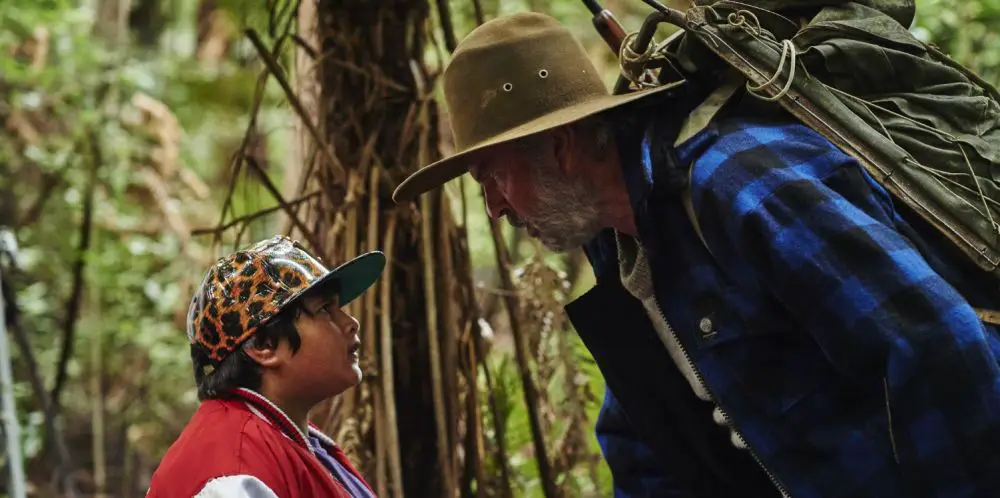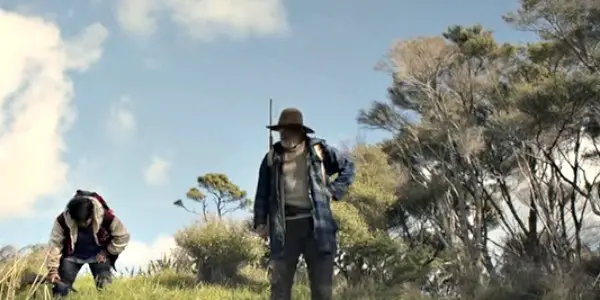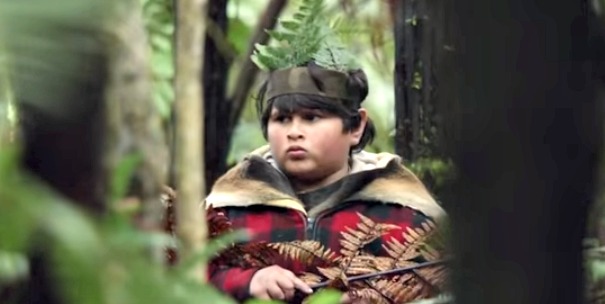HUNT FOR THE WILDERPEOPLE: The Balmy Wild

Ben is a former student of cognitive science who is…
Like much of writer/director Taika Waititi‘s other work, Hunt for the Wilderpeople finds humor in asking us to laugh at its characters. They all have some ridiculous traits, and we’re free to have fun at their expense. Some of them are delusional, some of them are myopic, and some of them totally lack self-consciousness. They’re often at fault for the trouble they get into, and wherever they end up as a consequence of that, the film is able to find humor in it.
But one of my favorite things about Waititi‘s work is that the comedy never precludes sympathy. While the characters’ faults may be at the core of the film’s jokes, they don’t define them. Rather, they fit into the larger schema of their overall behavior.
When Hunt for the Wilderpeople goes from laughing at their weaknesses to highlighting their strengths, the transition is seamless. It’s unabashedly sentimental, and some of the specific tragic notes threaten to come across as cloying, but the comedy – for the most part – gives it a lot of life.
Roots in Separation
The main characters (the titular “wilderpeople”) are a young delinquent named Ricky and his foster parent, a man in his mid-60s named Hector, played by Julien Dennison and Sam Neill respectively. Ricky has been in and out of all different kinds of homes; Hector doesn’t seem close with anyone but his wife and his dog.
They both live at a distance from the rest of the world, though it’s worth noting that Ricky isn’t cut off quite in the same way that Hector is. He’s younger, and unlike Hector, hasn’t spent his life out in the bush. He takes influence from pop culture, and the film makes it obvious.

When the narrative proper starts out, the two of them move further into isolation together. They end up wandering the bush, surviving on Hector’s knowledge of how to live in the wilderness. All the while, the law pursues them, led by a fanatical social worker who seems less concerned with Ricky’s well-being than with her own vague sense of importance (Rachel House, who works well with one of the film’s best roles). Instead of a sequence of interconnected events, the film follows things that pop up along the way as Ricky and Hector proceed on their journey, until their pursuers start to catch up with them.
Because so much of the film revolves around Ricky and Hector alone together, most of its comedy comes from their interplay. Fortunately, the aforementioned generational and cultural gaps between them offer up a lot of material to work with.
Not every joke lands: one (a long string of unintentional innuendos) is a little protracted and lacks the basis in human behavior that makes the others so strong, but for the most part, they’re witty and entertaining together.
Wild Advantages
Hunt for the Wilderpeople‘s wilderness setting highlights the differences between its protagonists and antagonists. Ricky and Hector’s isolation becomes literal. Their methods of surviving (scraping together whatever resources they can find and using natural patterns for guidance) become a point of contrast between them and their pursuers, who come well-equipped and in large numbers.
However, they aren’t completely different: like Ricky, the social worker chasing them seems to model herself after pop culture influences, leading to some of the film’s best jokes.

This difference between them reflects how the film values nature: as something that brings people in closer touch with their surroundings, which in turn brings out the ways Ricky and Hector can complement each other. Sometimes, Hunt for the Wilderpeople has the idealism of a pastoral, though for the most part the biting humor keeps it from that. It’s less about being in balance with nature than attaining balance between people who challenge each other.
In various interviews, Waititi has connected the way he manages comedy and tragedy to his Maori background. According to him, it leads him to approach sadness by acknowledging it, but also seeking joy and laughter. He aims to create the kind of mixed emotions he knows from Maori funerals, and the combination of celebrating and mourning they comprise.
To Conclude
There are only a couple pieces of conflict in Hunt for the Wilderpeople that aren’t elevated by comedy, and even then it’s never hard to watch. It can get a little samey because of this, but overall it remains engaging.
The contrasts between the characters’ personalities allows the film to capture a broad spectrum of variations on easily recognizable human tendencies. The best word to describe it is probably “pleasant,” but there’s a slight hint of complication to it. It’s as reliable for a good laugh as Waititi‘s other work, which says a lot.
How do you respond to Waititi’s way of mixing tones?
Hunt for the Wilderpeople was released in New Zealand on March 31, 2016, and has been in limited release in the United States since June 24, 2016. Find international release dates here.
Does content like this matter to you?
Become a Member and support film journalism. Unlock access to all of Film Inquiry`s great articles. Join a community of like-minded readers who are passionate about cinema - get access to our private members Network, give back to independent filmmakers, and more.
Ben is a former student of cognitive science who is currently trying to improve his writing style and ability to understand and appreciate films containing unfamiliar perspectives. He tries not to hold films to a strict set of criteria, but does believe that strong movies can change your outlook on the world. His favorite films include Whisper of the Heart, Hellzapoppin', Foolish Wives, 42nd Street, and the work of Charlie Chaplin.













